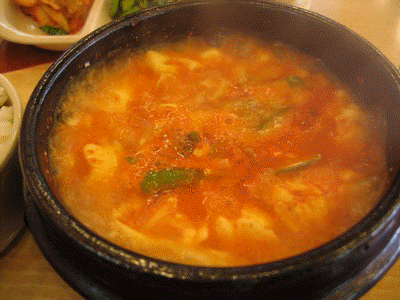Saltah (Yemen)

Saltah is the national dish of Yemen, featured on the Sanaa episode. It’s a brown meat stew, cooked and served in a hot stone bowl that keeps it boiling hot for you. Everyone has their own version of saltah, lamb, beef, chicken and even vegan. It’s traditionally simmered over a flame, but it sounds like it can be nicely done in your instant pot. Saltah can have potatoes, eggs, rice, tomatoes, peppers, onions, whatever you have on hand. It’s generally straightforward: simmer your aromatics, add your spices like cumin, coriander and turmeric, then brown your meat, add water and any additional veggies, and simmer.
So that’s a pretty typical stew, right? Well, what makes salty particularly special are the two condiments you throw on at the end. The first is holba, a fenugreek foam. Yeah. You soak a smidge of ground fenugreek in water until it becomes a paste, then you whip that into a foam along with tomato, garlic, lemon juice and chili pepper. That foam goes over the simmering stew right when you’re ready to serve.
The second condiment is zhug, or bisbas or sahawiq, it’s all the same thing. I like Zhug because it reminds me of Zuul, the gatekeeper. It’s basically a pesto of hot green or red peppers, cilantro, garlic, and olive oil with some spices. It’s magnificent. I’d put zhug on anything. It’s more herbaceous than harissa. Yemeni Jews brought it to Israel, where it’s a critical part of the cuisine there. And a little dollop to zing up your saltah will not go amiss. Eat with a baked flatbread like pita. It’s excellent.
Makes four servings
INGREDIENTS
For Zhug
-
1/4 teaspoon whole coriander seed
-
1/2 teaspoon whole cumin seeds
-
1/4 teaspoon freshly ground black pepper
-
4 medium cloves garlic, roughly chopped
-
4 to 6 fresh Thai bird chilies, red or green (to taste), roughly chopped; or 4 dried chiles de árbol, stemmed, seeded, and torn into fine pieces
-
1 teaspoon kosher salt, plus more to taste
-
2 ounces fresh parsley and cilantro leaves and fine stems (about 2 loosely packed cups of mixed herbs)
-
1/2 cup (120ml) extra-virgin olive oil
For Saltah
-
1 tbsp. oil
-
3 cloves garlic, minced
-
Half onion, chopped
-
½ green chili pepper, chopped, more or less to taste
-
½ tsp cumin
-
½ tsp coriander
-
¼ tsp turmeric
-
3/4 tsp. salt
-
1 lb. beef cubes (or lamb or chicken thighs)
-
5 cups water
For Holba
-
Water
-
2 tsp. ground fenugreek
-
2 tbsp. Zhug
STEPS
For Zhug:
-
Combine coriander seed, cumin, and black pepper in a food processor and grind into a powder. You can use a mortar and pestle, of course.
-
Add garlic, chilies, and salt and blend into a rough paste.
-
Add cilantro and parsley one small handful at a time and continue blending into the paste. (By the time you're done, there should be no pieces of chilies or herbs larger than 1/8 inch remaining.)
-
With the processor running, slowly drizzle in olive oil to form an emulsion.
-
Season to taste with more salt.
-
Zhug can be served immediately or stored in an airtight container in the refrigerator for several week
For Holba
-
Place ground fenugreek in a small bowl of water and let sit for at least one hour.
-
Drain water.
-
Whip the fenugreek by hand or using a mixer. Whip until the color has changed from brown to white and the bitter taste is gone. This should take about 10 minutes beating by hand.
-
Add prepared zhug to the fenugreek and whip in. Add more or less depending on how spicy you'd like it.
For Saltah
-
Place dutch oven on medium heat and sauté garlic, onion, and chili pepper in oil until garlic browns and onion is translucent.
-
Add cumin, coriander, turmeric, and salt.
-
Add beef (or lamb or chicken) to onion mixture. Brown the meat for 5 minutes.
-
Add water to the mixture and bring to a boil. Then cover, reducing heat to a low simmer.
-
Cook stew for 1 - 2 hours, or until meat is tender and breaks apart
-
Remove from heat and break the meat apart with a fork to get smaller shreds. The consistency of the broth should be similar to a slightly thick soup; if the broth is too thick, you may add extra water. If it's not thick enough, turn heat to medium and reduce.
-
Add a few dollops of whipped holba, and serve hot with some extra zhug and a side of fresh bread, preferably pita or naan or similar.
Recipe adapted from http://www.shebayemenifood.com/content/fahsa-saltah and https://www.seriouseats.com/recipes/2016/03/schug-zhug-srug-yemenite-israeli-hot-sauce-recipe.html
Photo by Wikipedia user Sadq5




